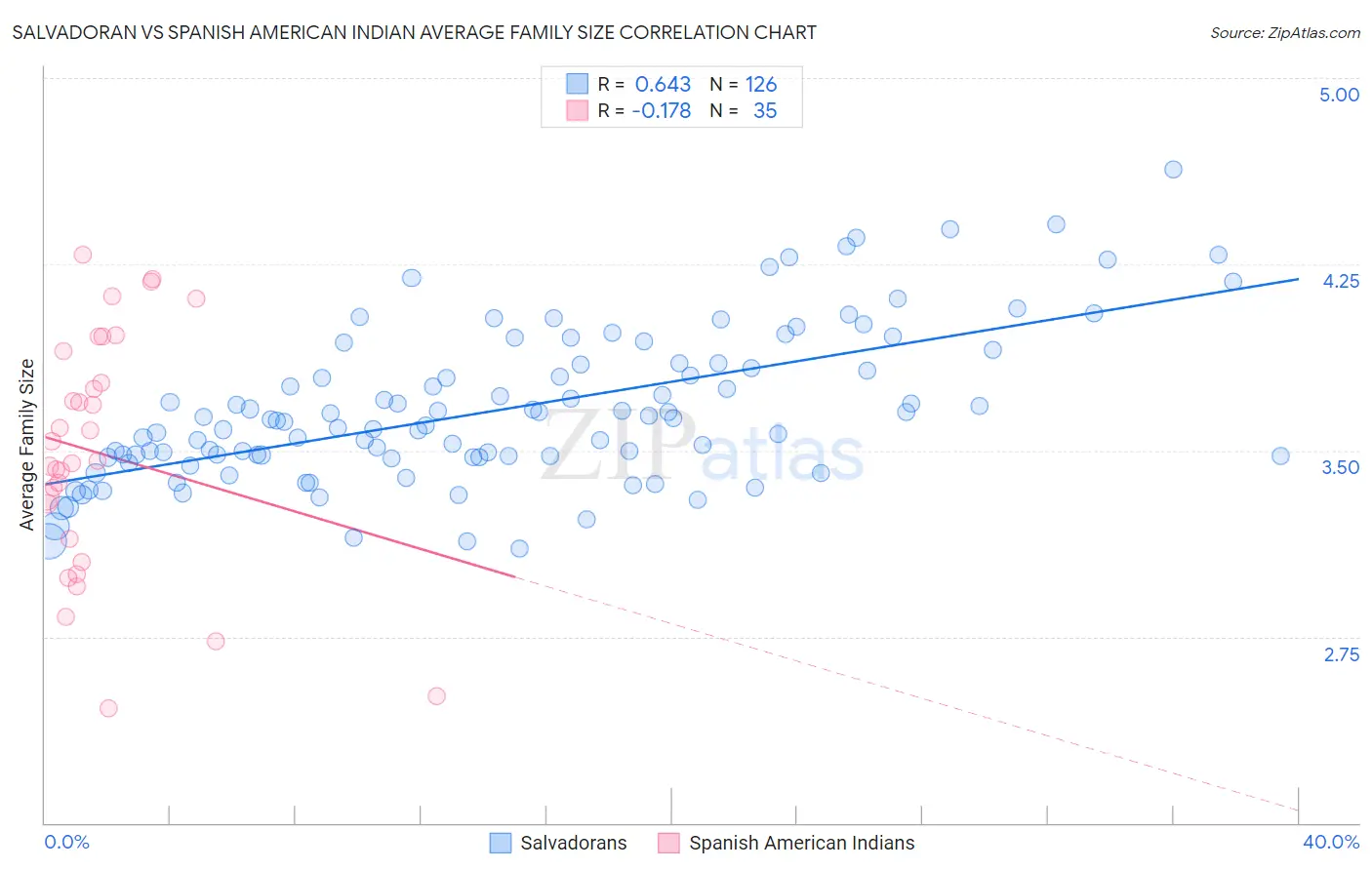Salvadoran vs Spanish American Indian Average Family Size
COMPARE
Salvadoran
Spanish American Indian
Average Family Size
Average Family Size Comparison
Salvadorans
Spanish American Indians
3.48
AVERAGE FAMILY SIZE
100.0/ 100
METRIC RATING
18th/ 347
METRIC RANK
3.58
AVERAGE FAMILY SIZE
100.0/ 100
METRIC RATING
10th/ 347
METRIC RANK
Salvadoran vs Spanish American Indian Average Family Size Correlation Chart
The statistical analysis conducted on geographies consisting of 398,698,929 people shows a significant positive correlation between the proportion of Salvadorans and average family size in the United States with a correlation coefficient (R) of 0.643 and weighted average of 3.48. Similarly, the statistical analysis conducted on geographies consisting of 73,145,550 people shows a poor negative correlation between the proportion of Spanish American Indians and average family size in the United States with a correlation coefficient (R) of -0.178 and weighted average of 3.58, a difference of 3.0%.

Average Family Size Correlation Summary
| Measurement | Salvadoran | Spanish American Indian |
| Minimum | 3.10 | 2.46 |
| Maximum | 4.63 | 4.29 |
| Range | 1.53 | 1.83 |
| Mean | 3.67 | 3.49 |
| Median | 3.62 | 3.46 |
| Interquartile 25% (IQ1) | 3.47 | 3.15 |
| Interquartile 75% (IQ3) | 3.85 | 3.90 |
| Interquartile Range (IQR) | 0.37 | 0.75 |
| Standard Deviation (Sample) | 0.31 | 0.48 |
| Standard Deviation (Population) | 0.31 | 0.47 |
Demographics Similar to Salvadorans and Spanish American Indians by Average Family Size
In terms of average family size, the demographic groups most similar to Salvadorans are Mexican (3.48, a difference of 0.070%), Cheyenne (3.47, a difference of 0.11%), Immigrants from El Salvador (3.49, a difference of 0.25%), Ute (3.49, a difference of 0.34%), and Yuman (3.47, a difference of 0.36%). Similarly, the demographic groups most similar to Spanish American Indians are Hopi (3.60, a difference of 0.35%), Immigrants from Yemen (3.60, a difference of 0.36%), Inupiat (3.63, a difference of 1.2%), Arapaho (3.64, a difference of 1.4%), and Tohono O'odham (3.53, a difference of 1.4%).
| Demographics | Rating | Rank | Average Family Size |
| Pima | 100 /100 | #4 | Exceptional 3.75 |
| Navajo | 100.0 /100 | #5 | Exceptional 3.65 |
| Arapaho | 100.0 /100 | #6 | Exceptional 3.64 |
| Inupiat | 100.0 /100 | #7 | Exceptional 3.63 |
| Immigrants | Yemen | 100.0 /100 | #8 | Exceptional 3.60 |
| Hopi | 100.0 /100 | #9 | Exceptional 3.60 |
| Spanish American Indians | 100.0 /100 | #10 | Exceptional 3.58 |
| Tohono O'odham | 100.0 /100 | #11 | Exceptional 3.53 |
| Immigrants | Mexico | 100.0 /100 | #12 | Exceptional 3.52 |
| Sioux | 100.0 /100 | #13 | Exceptional 3.52 |
| Immigrants | Central America | 100.0 /100 | #14 | Exceptional 3.49 |
| Tongans | 100.0 /100 | #15 | Exceptional 3.49 |
| Ute | 100.0 /100 | #16 | Exceptional 3.49 |
| Immigrants | El Salvador | 100.0 /100 | #17 | Exceptional 3.49 |
| Salvadorans | 100.0 /100 | #18 | Exceptional 3.48 |
| Mexicans | 100.0 /100 | #19 | Exceptional 3.48 |
| Cheyenne | 100.0 /100 | #20 | Exceptional 3.47 |
| Yuman | 100.0 /100 | #21 | Exceptional 3.47 |
| Apache | 100.0 /100 | #22 | Exceptional 3.46 |
| Immigrants | Fiji | 100.0 /100 | #23 | Exceptional 3.45 |
| Natives/Alaskans | 100.0 /100 | #24 | Exceptional 3.45 |